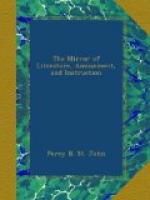Some one came up to Paley and made an excuse for a friend, who was obliged to defer an intended visit to the subdeanery, because a man who had promised to pay him some money in April, could not pay it till May. “A common case,” said Paley. We all laughed. Paley, by way of rewarding us for our complaisance in being pleased with what was recommended chiefly by the quaintness of his manner, went on:—“A man should never paay mooney till he can’t help it; soomething maay happen.”
At another time he said, “I always desire my wife and daughters to pay ready money. It is of no use to desire them to buy only what they want; they will always imagine they want what they wish to buy; but that paying ready mooney is such a check upon their imagin_aa_tion.”
Paley’s education had been sufficiently hardy. “My father rode to Peterborough, and I rode after him, on a horse that I could not manage. I tumbled off. My father, without looking back, cried out, ’Get up again, Will.’ When I set up a carriage, it was thought right that my armorial bearings should appear on the panels. Now, we had none of us ever heard of the Paley arms; none of us had ever dreamed that such things existed, or had ever been. All the old folks of the family were consulted; they knew nothing about it. Great search was made, however, and at last we found a silver tankard, on which was engraved a coat of arms. It was carried by common consent that these must be the Paley arms; they were painted on the carriage, and looked very handsome. The carriage went on very well with them; and it was not till six months afterwards that we found out that the tankard had been bought at a sale!”
He told me, “when I wanted to write any thing particularly well,—to do better than ordinary,—I used to order a post-chaise and go to Longtown; it is the first stage from Carlisle towards the north; there is a comfortable, quiet inn there. I asked for a room to myself; there then I was, safe from the bustle and trouble of a family; and there I remained as long as I liked, or till I had finished what I was about.” I said, “That is a very curious anecdote;” and I said it in a tone which, from a certain change in his countenance, I believe to have set him on musing how this anecdote would appear in the history of his life. Paley took his rides on horseback occasionally, but always alone, without the attendance even of a servant. “I am so bad a horseman, that if any man on horseback was to come near me when I am riding, I should certainly have a fall; company would take off my attention, and I have need of all I can command to manage my horse and keep my seat; I have got a horse, the quietest creature that ever lived, one that at Carlisle used to be covered with children from the ears to the tail.” Understanding all this, and seeing him gambadoing on the race-course, I turned my horse’s head another way. “I saw what you meant this morning;




